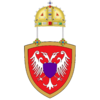Hui
| Hui
洄 | |
|---|---|
| Flag | Coat of arms |

| |
| Motto: | |
| Anthem: | |
| Locator map | |
 | |
| Capital city | Ānmèn (岸門) |
| Largest city | Ānmèn (岸門) |
| Official language | Yanhua, Fi |
| Other languages | |
| Ethnic groups | Yan |
| Religion | |
| Demonym(s) | Hui |
| Government | |
| Government Type | Senatorial Plutocracy |
| Lawkeeper | |
| Legislature | The Tǒnghuì (統會) |
| Establishment | |
| The First Dynasty | 5104 RH |
| Area | |
| Total | 6,896,101.99 km2 |
| Water % | 0.0% |
| Population | |
| Total | 33,511,183 |
| Density | 151.76/km2 |
| Economy | |
| Economy type | Communitarian Capitalism |
| GDP (total) | Ꞡ 301,600,642,356.57 |
| GDP per capita | Ꞡ 9,000.00 |
| Currency | samp_nat_currency |
| Currency symbol | |
| Inequality index | 0.0 |
| Development index | 0.0 |
| Other information | |
| Time zone | TBC |
| Driving side | right |
| Calling code | +116 |
| Internet code | .yan |
Hui (洄) is a small country on the northwestern coast of Davai. Although still in theory under the rule of senate of sorts, in practice Hui has effectively been a vassal of Yanwen for the past sixty years, with the Yan army actually occupying the country in the last two years.
Etymology
Hui is derived from the Yannic word huí (洄), in its sense of "flowing water". The name was a reference to the tides which gave the country its ability to trade with others, and also lends its name to the stretch of coast it is built upon. It is also a reference to the Hui sub-ethnicity (Hui: Fì), whose language is still common on the coast.
History
Prehistory
The area was inhabited some 30,000 years before the present day by a Davaian ethnicity closely related to the modern Shriaav people. This is still visible in much of the architecture present in the region, as well as in the cuisine. There has also been a great deal of intermixing with the Penduan peoples to the northwest.
Arrival of the Yan (4700-5300 RH)
Nevertheless, the main ethnicity in this area has for over two and a half thousand years remained the Yan, who travelled north and west during the Collapse of their initial civilization.
Government
The government of Hui is described not so much as an administration as as an argument. Each of the bloodlines maintains control over certain lands, territories, and shipyards; each of them is technically equal in the eyes of the others; each of them wants to maintain a position of power over the others. Consensus is important when it comes to decisions of council; even the position of Lawkeeper is one that is practically unofficial, assigned to the individual with the greatest diplomatic efforts between bloodlines.
Culture
Bloodlines
There were at one point thirty-two recorded bloodlines in Hui:
Dài (䲦), from the Blacks.
Lì (㻎), from the Blacks. This bloodline is primarily agricultural.
Fán (樊), from the Blacks.
Tái (旲), from the Blacks.
Bó (鉑), from the Whites. This bloodline largely deals in silks and silk products.
Quán (泉), from the Whites.
Xí (習), from the Whites. This bloodline cultivates their own varieties of high-quality tea.
Pò (䞟), from the Whites.